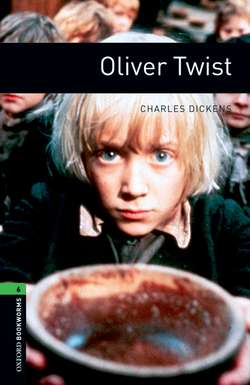Читать книгу Oliver Twist - Charles Dickens - Страница 4
На сайте Литреса книга снята с продажи.
1
Oliver’s early life
ОглавлениеOliver Twist was born in a workhouse, and when he arrived in this hard world, it was very doubtful whether he would live beyond the first three minutes. He lay on a hard little bed and struggled to start breathing.
Oliver fought his first battle without much assistance from the two people present at his birth. One was an old woman, who was nearly always drunk, and the other was a busy local doctor, who was not paid enough to be very interested in Oliver’s survival. After all, death was a common event in the workhouse, where only the poor and homeless lived.
However, Oliver managed to draw his first breath, and then announced his arrival to the rest of the workhouse by crying loudly. His mother raised her pale young face from the pillow and whispered, ‘Let me see the child, and die.’
The doctor turned away from the fire, where he had been warming his hands. ‘You must not talk about dying yet,’ he said to her kindly. He gave her the child to hold. Lovingly, she kissed the baby on its forehead with her cold white lips, then stared wildly around the room, fell back – and died.
‘Poor dear!’ said the nurse, hurriedly putting a green glass bottle back in the pocket of her long skirt.
The doctor began to put on his coat. ‘The baby is weak and will probably have difficulties,’ he said. ‘If so, give it a little milk to keep it quiet.’ Then he looked at the dead woman. ‘The mother was a good-looking girl. Where did she come from?’
‘She was brought here last night,’ replied the old woman. ‘She was found lying in the street. She’d walked some distance, judging by her shoes, which were worn to pieces. Where she came from, where she was going to, or what her name was, nobody knows.’
The doctor lifted the girl’s left hand. ‘The old story,’ he said sadly, shaking his head. ‘No wedding ring, I see. Ah! Good night.’
And so Oliver was left with only the drunken nurse. Without clothes, under his first blanket, he could have been the child of a king or a beggar. But when the woman dressed him later in rough cotton clothes, yellow with age, he looked exactly what he was – an orphan in a workhouse, ready for a life of misery, hunger, and neglect.
Oliver cried loudly. If he could have known that he was a workhouse orphan, perhaps he would have cried even more loudly.
There was no one to look after the baby in the workhouse, so Oliver was sent to a special ‘baby farm’ nearby. There, he and thirty other children rolled around the floor all day, without the inconvenience of too much food or too much clothing. Mrs Mann, the old woman who ‘looked after’ them, was very experienced. She knew what was good for children, and a full stomach was very dangerous to their health. She also knew what was good for herself, so she kept for her own use the money that she was given for the children’s food. The board responsible for the orphans sometimes checked on the health of the children, but they always sent the beadle, a kind of local policeman, to announce their visit the day before. So whenever the board arrived, of course, the children were always neat and clean.
This was the way Oliver was brought up. Consequently, at the age of nine he was a pale, thin child and short for his age. But despite frequent beatings by Mrs Mann, his spirit was strong, which was probably the reason why he managed to reach the age of nine at all.
On Oliver’s ninth birthday, Mr Bumble the beadle came to the house to see Mrs Mann. Through the front window Mrs Mann saw him at the gate, and turned quickly to the girl who worked with her.
‘Quick! Take Oliver and those others upstairs to be washed!’ she said. Then she ran out to unlock the gate. (It was always kept locked to prevent official visitors walking in unexpectedly.)
‘I have business to talk about,’ Mr Bumble told Mrs Mann as he entered the house. He was a big fat man, often bad-tempered, and was full of self-importance. He did not like to be kept waiting at a locked gate.
Mrs Mann took his hat and coat, placed a chair for him, and expressed great concern for his comfort. ‘You’ve had a long walk, Mr Bumble,’ she said, ‘and you must be thirsty.’ She took out a bottle from the cupboard.
‘No, thank you, Mrs Mann. Not a drop.’ He waved the bottle away.
‘Just a little drop, Mr Bumble, with cold water,’ said Mrs Mann persuasively.
Mr Bumble coughed. ‘What is it?’ he asked, looking at the bottle with interest.
‘Gin. I keep it for the children’s medicine drink.’
‘You give the children gin, Mrs Mann?’ asked Mr Bumble, watching as she mixed his drink.
‘Only with medicine, sir. I don’t like to see them suffer.’
‘You’re a good woman, Mrs Mann.’ Mr Bumble drank half his glass immediately. ‘I’ll tell the board about you. Now – the reason why I’m here. Oliver Twist is nine years old today. We’ve never been able to discover anything about his parents.’
‘Then how did he get his name?’
‘I gave it to him,’ said Mr Bumble proudly. ‘We follow the alphabet. The last one was an S – Swubble. Then it was T, so this one is Twist. The next one will be Unwin. Anyway, Oliver Twist is now old enough to return to the workhouse. Bring him here, please.’ While Mrs Mann went to get him, Mr Bumble finished the rest of his gin.
